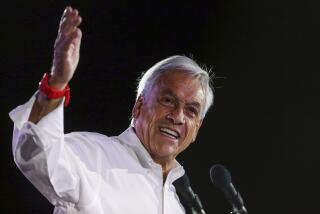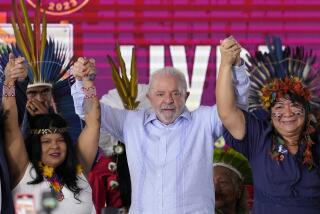Cracks Appear in Chile’s Ruling Junta
- Share via
SANTIAGO, Chile — Cracks appeared in Chile’s ruling military junta this past week when one of its four members declared that he will withdraw to civilian life in 1989, once democracy is fully established.
The announcement was a clear indication that Chile’s erstwhile monolithic armed forces are divided on whether to back President Augusto Pinochet beyond that year.
The Reagan Administration sent a top official to Chile last week to convey Washington’s impatience with Pinochet’s intransigence and talk to junta members about the government’s intentions after Pinochet’s term ends in 1989.
The 70-year-old army general, who has ruled Chile since a CIA-backed coup in 1973, forced the issue by telling the nation he intends to win a single-candidate plebiscite in 1989 and stay on another eight years.
Won’t Hand It Over
“We are not going to hand over the government for the heck of it,” an entrenched Pinochet told supporters in a small rural town.
For opposition leaders, this only confirmed fears that Pinochet intends to perpetuate himself in power, ignoring mounting pressures at home and abroad to restore democracy.
Pinochet still commands the support of Chile’s Prussian-modeled army, which he has increasingly deployed to repress mass protests in Santiago slums. But the other forces are known to be uneasy.
The country’s political future now hinges to a great extent on what happens in the junta.
The body formed by the commanders of the three armed forces and the chief of police must decide by Dec. 11, 1988, who the single candidate in the yes-or-no plebiscite will be.
First Public Break
Gen. Fernando Matthei, the air force commander and a fighter pilot with close ties to the United States, was the first junta member to publicly favor a withdrawal by the military from the government.
Matthei not only said he is stepping down in 1989, but he also suggested that the junta could introduce reforms to allow free elections, a longstanding demand by opposition parties who say Chile’s constitution could keep Pinochet in power until the end of the century.
“My constitutional mandate ends in 1989,” Matthei said.
“In that year, there will be an elected congress, legal political parties and everything that a full democracy represents. My task until then includes the designation of a presidential candidate for the plebiscite. We may even reform the constitution so that there can be direct, open elections.”
Robert Gelbard, deputy assistant secretary of state for South American affairs, met Matthei the day before his public statement. He also saw Adm. Jose Toribio Merino and police chief Rodolfo Stange to learn their plans for 1989 and after.
“The United States supports a peaceful transition to full democratic rule in Chile by the most prompt and effective means,” Gelbard said.
Gelbard said Pinochet must legalize political parties, restore the right of assembly and allow freedom of speech and the press to enable a transition to begin.
He also attacked Chile’s large, outlawed Communist Party for advocating terrorism and warned that dialogue and pragmatism are needed to steer Chilean society away from violent radicalization.
Merino and Stange, whose forces are known to favor reform, were noncommittal on the virtual launching of Pinochet’s campaign for the 1989 plebiscite.
They both told the nation that a candidate has not been chosen, indicating that they would not necessarily back Pinochet after 1989.
‘Any Man on the Street’
“It could be anyone, any man on the street,” Merino said in a rare burst of populism.
Merino’s position is considered important because he was one of the main planners of the coup that overthrew Marxist President Salvador Allende in 1973 and is the only original member on the junta with Pinochet.
More to Read
Sign up for Essential California
The most important California stories and recommendations in your inbox every morning.
You may occasionally receive promotional content from the Los Angeles Times.










